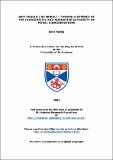Files in this item
Why should I be moral? : toward a defence of the categoricity and normative authority of moral considerations
Item metadata
| dc.contributor.advisor | Skorupski, John | |
| dc.contributor.advisor | Broadie, Sarah | |
| dc.contributor.author | Hurtig, Kent | |
| dc.coverage.spatial | 296 p. | en_US |
| dc.date.accessioned | 2018-04-25T15:27:15Z | |
| dc.date.available | 2018-04-25T15:27:15Z | |
| dc.date.issued | 2004 | |
| dc.identifier.uri | https://hdl.handle.net/10023/13223 | |
| dc.description.abstract | Can we ever be fully practically justified in acting contrary to moral demands? My contention is that the answer is 'no'. I argue that by adopting a 'buck-passing' account of wrongness we can provide a philosophically satisfying answer to the familiar 'why should I be moral?'. In working my way toward the buck-passing account of wrongness, I outline (and, to some degree, defend) the metaethical and 'metanormative' assumptions on which my theory stands. I also consider and reject the 'internalist' (or as it can also be described, the neo-Humean) answer to 'why should I be moral?'. The account I end up with is decidedly non-consequentialist and it is consistent with common-sense morality. It also provides a way of showing why moral considerations (in competition with non-moral considerations) are overridingly normative in a way that is consistent with our best current understanding of what practical reason requires of us. | en_US |
| dc.language.iso | en | en_US |
| dc.publisher | University of St Andrews | |
| dc.subject.lcc | BJ1031.H8 | |
| dc.subject.lcsh | Ethics. | en |
| dc.subject.lcsh | Reason. | en |
| dc.title | Why should I be moral? : toward a defence of the categoricity and normative authority of moral considerations | en_US |
| dc.type | Thesis | en_US |
| dc.type.qualificationlevel | Doctoral | en_US |
| dc.type.qualificationname | PhD Doctor of Philosophy | en_US |
| dc.publisher.institution | The University of St Andrews | en_US |
This item appears in the following Collection(s)
Items in the St Andrews Research Repository are protected by copyright, with all rights reserved, unless otherwise indicated.

